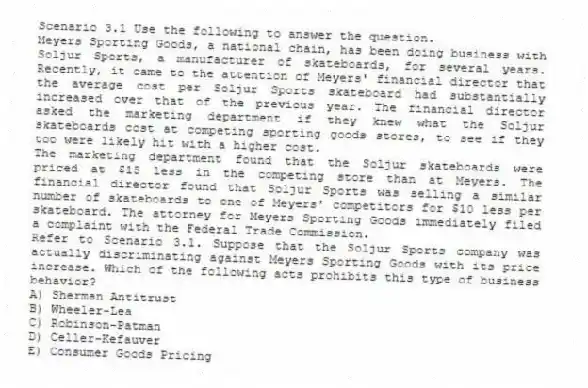
Scenario 3.1 Use the following to answer the question.
Meyers Sporting Goods, a national chain, has been doing business with Soljur Sports, a manufacturer of skateboards, for several years. Recently, it came to the attention of Meyers' financial director that the average cost per Soljur Sports skateboard had substantially increased over that of the previous year. The financial director asked the marketing department if they knew what the Soljur skateboards cost at competing sporting goods stores, to see if they too were likely hit with a higher cost.
The marketing department found that the Soljur skateboards were priced at $15 less in the competing store than at Meyers. The financial director found that Soljur Sports was selling a similar number of skateboards to one of Meyers' competitors for $10 less per skateboard. The attorney for Meyers Sporting Goods immediately filed a complaint with the Federal Trade Commission.
Refer to Scenario 3.1. Suppose that the Soljur Sports company was actually discriminating against Meyers Sporting Goods with its price increase. Which of the following acts prohibits this type of business behavior?
A) Sherman Antitrust
B) Wheeler-Lea
C) Robinson-Patman
D) Celler-Kefauver
E) Consumer Goods Pricing
Correct Answer:
Verified
Q169: Which of the following industries is most
Q170: When a firm continues to violate what
Q171: The Pharmaceutical Research and Manufacturers of America
Q172: Which of the following are the most
Q173: Of all the federal regulatory units, the
Q175: Scenario 3.1 Use the following to answer
Q176: Which of the following is an advantage
Q177: The Sherman Antitrust Act, along with several
Q178: Which of the following statements about self-regulatory
Q179: Scenario 3.1 Use the following to answer
Unlock this Answer For Free Now!
View this answer and more for free by performing one of the following actions

Scan the QR code to install the App and get 2 free unlocks

Unlock quizzes for free by uploading documents